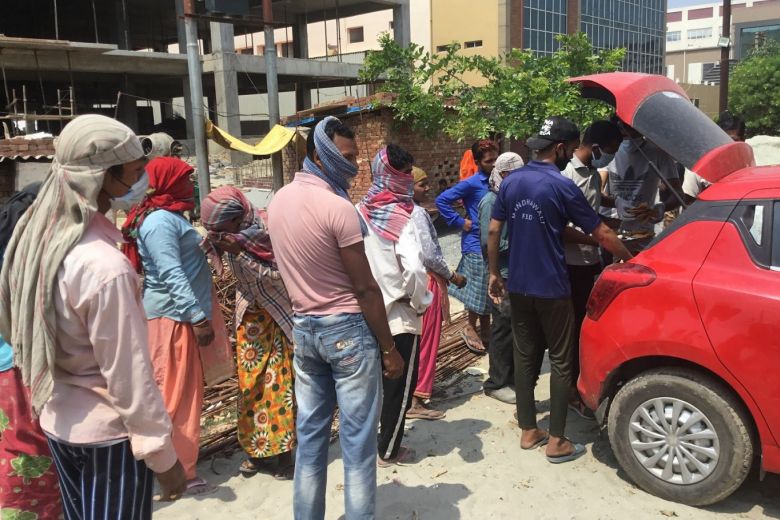India cautiously emerges from lockdown
NEW DELHI — India is gradually coming out of what has been one of the strictest lockdowns in the world.
The easing of restrictions, including allowing people to leave their homes between 7am and 7pm and shops to reopen, comes amid concerns that the economic cost of continuing the lockdown will cause greater suffering than the coronavirus itself.
The lockdown was lifted despite rising infection numbers, with the country recording the highest spike of 3,875 new cases on Tuesday (May 5).
Mr Gurmeet Singh reopened his garment shop in Noida, one of Delhi’s satellite cities, on Tuesday after nearly a month and a half. While India went into lockdown beginning March 25, he was asked by local authorities to shutter his store on March 21.
He waited till 5 pm but didn’t get a single customer.
“People are still scared to step out,” he told The Straits Times, as he supervised two employees clearing the dust that had accumulated inside his shop after being shut for more than 45 days straight.
He decided to keep his shop shut again till May 17, when the government will make the call on whether to further ease restrictions.
“I am going to see if things pick up in a month or so and then decide what my next course of action will be. If business doesn’t improve, I may even have to think of shutting this shop down for good and starting something else,” he added.
Many owners of neighbourhood and standalone shops shared this sentiment.
Lockdown restrictions have been eased since Monday (May 4), with offices permitted to open with a third of usual staff strength on site, and other businesses allowed to reopen with distancing safeguards.
International and domestic flights remain suspended, as are cross-country travel and public transport, with the government set to review further easing of restrictions on May 17.
Crowding and chaos were reported at liquor vendors, which were shut since the lockdown was instituted. Vegetable and fruit markets were packed, and vehicular traffic intensified.
Restrictions may have eased, but virologists said India is definitely not out of the woods.
The nation, which had a few hundred cases at the beginning of the lockdown, now has 49,391 cases and 1,694 fatalities.
Active cases are now growing at 6.6 per cent – a doubling every 11 days, tweeted Professor Shamika Ravi, a senior fellow at Brookings Institute and former member of PM’s Economic Advisory Council. On May 4, it was doubling every 13 days.
Cases have been increasing at a worrying rate in some states including Maharashtra, Gujarat and Tamil Nadu.
“This is going to be an avalanche of an epidemic. It will steadily grow until it hits the ground and then it dissipates. India does not have the volume of cases like Italy but the speed (of increase) is there,” said virologist Dr T Jacob John, who formerly headed the Indian Council for Medical Research’s Centre for Advanced Research in Virology. “In India, there was a lot of optimism in the middle (of the lockdown) that things wouldn’t get bad. But that’s not the case now.”
With numbers still going up, fear and paranoia over the virus have not dissipated.
Companies are still figuring out how to have staff resume work in the office with safe distancing measures.
In many gated communities and residential areas, for instance, residents are still wary of allowing part-time domestic workers, who work in multiple houses, back into their homes.
Ms Juhi Mittal, a chartered accountant, has decided against asking her two part-time domestic workers to come back to work at her home in Delhi, even though she has continued to pay their salaries.
“Technically, everyone is at risk as part-timers are going to too many houses,” said Ms Mittal.
On the ground, the partial loosening of restrictions has led to some chaos and confusion around what activities can restart.
Mr Rakesh Kumar, a daily wage worker at a construction site in Noida, was happy to start working again on Tuesday, only to be told to stop work later in the day.
“I had hoped to restart work so that I can send money back home again,” he said.
Mr Kumar would send around 5,000 rupees (S$93.5) back home each month in happier days, but has not been able to do so for nearly two months.
One of the 35 workers at the site, who goes by the single name Nasir, said: “No one knows when work will restart. And if it does, there is no certainty it won’t stop again. Meanwhile, the threat of the pandemic keeps growing.”
For more news about the novel coronavirus click here.
What you need to know about Coronavirus.
For more information on COVID-19, call the DOH Hotline: (02) 86517800 local 1149/1150.
The Inquirer Foundation supports our healthcare frontliners and is still accepting cash donations to be deposited at Banco de Oro (BDO) current account #007960018860 or donate through PayMaya using this link.
